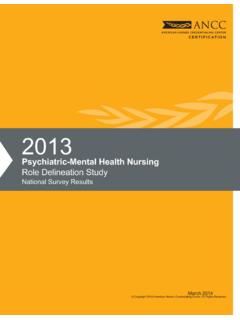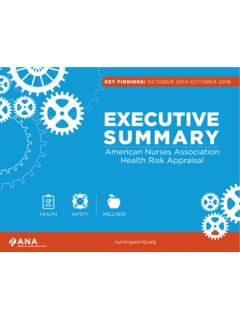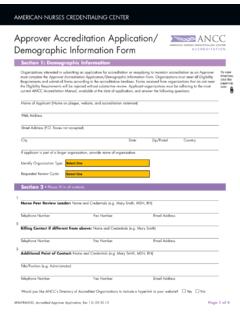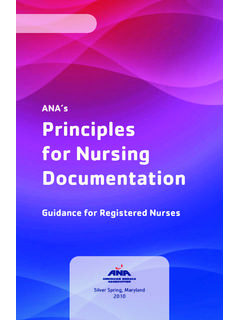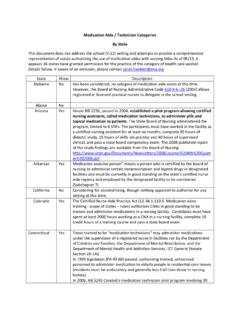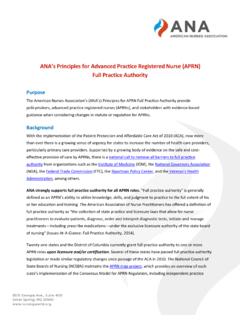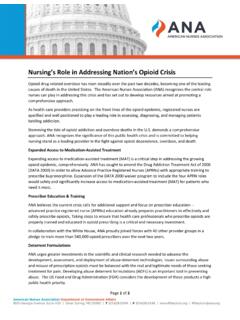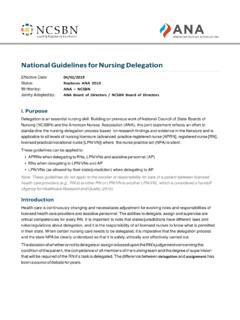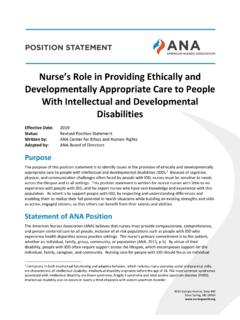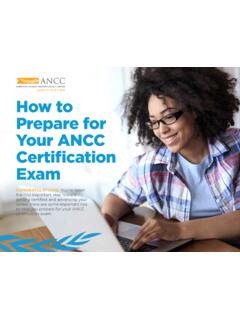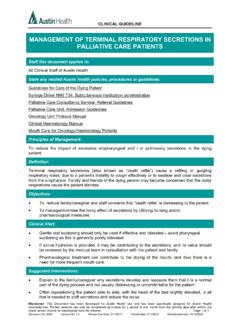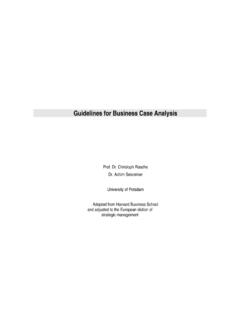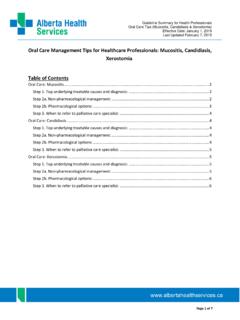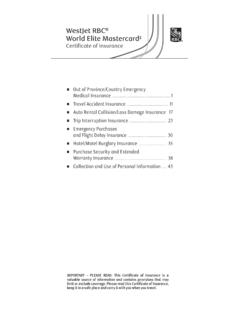Transcription of Nutrition and Hydration at the End of Life
1 8515 Georgia Avenue, Suite 400 Silver Spring, MD 20910 Nutrition and Hydration at the End of Life Effective Date: 2017 Status: Revised Position Statement Written by: ANA Center for Ethics and Human Rights Adopted by: ANA Board of Directors Purpose The purpose of this position statement is twofold. The first is to clarify nurses roles in the care of patients at the end of life, for whom decisions regarding artificial Nutrition and Hydration are being considered. The second is to explain how nurses can work with other health care professionals, patients and surrogate decision-makers who are representing the patients preferences. Discussions should include the risks, benefits and alternatives to various forms of Nutrition and Hydration for people who are dying. Dimensions to be discussed include comfort feedings, as well as decisions to forgo food and fluids, dietary supplements, and artificially administered Nutrition and Hydration .
2 Statement of ANA Position Adults with decision-making capacity, and surrogate decision-makers for patients who lack capacity, are in the best position to weigh the risks, benefits and burdens of Nutrition and Hydration at the end of life, in collaboration with the health care team. The acceptance or refusal of clinically appropriate food and fluids, whether delivered by oral or artificial means, must be respected, provided the decision is based on accurate information and represents patient preferences. If a patient chooses food, even if that intake may cause harm ( , oral feedings in people who are at risk of aspirating), the nurse is responsible for minimizing risk ( , using both positional changes and slow, assisted feedings). This is consistent with ANA s values and goals of respect for autonomy, relief of suffering and expert care at the end of life (ANA, 2015; ANA, 2016).
3 The decision to voluntarily stop eating and drinking, referred to here as VSED, with the intention of hastening death can be made only by those patients with decision-making capacity, not by surrogates. A patient s decision regarding VSED remains binding, even if the patient subsequently loses capacity. Recommendations ANA Recommends that: Nurses recognize those situations when Nutrition and Hydration can no longer benefit a patient, and adhere to clinical standards that include providing Nutrition and Hydration only to patients for whom it is indicated. 8515 Georgia Avenue, Suite 400 Silver Spring, MD 20910 Page | 2 Nutrition and Hydration at the End of Life Patients with decision-making capacity or their surrogates, who are relying on the patients preference or have knowledge of the person s values and beliefs will be supported in decision-making about accepting or refusing clinically appropriate Nutrition and Hydration at the end of life.
4 Nurses will have adequate and accurate information to understand patients cultural, ethnic, and religious beliefs and values regarding Nutrition and Hydration at the end of life. Patients views and beliefs should be respected. Nurses will support patients and surrogates in the decision-making process by providing accurate, precise and understandable information about risks, benefits and alternatives. Decisions about accepting or forgoing Nutrition and Hydration will be honored, including those decisions about artificially delivered Nutrition as well as VSED. People with decision-making capacity have the right to stop eating and drinking as a means of hastening death. Supporting Material The fundamental principle that underlies all nursing practice is respect for the inherent dignity of all individuals. That respect is operationalized through the principles of respect for autonomy and self-determination, and manifested in dimensions of culture, values, religious or spiritual beliefs, lifestyle, social support system, sexual orientation or gender expression, and primary language.
5 Patients have the moral and legal right to determine what will be done with and to their own person (ANA, 2015, p. 2). They have the right to accurate, complete and understandable information, and to be supported as they weigh the benefits, burdens and options for their treatments, including the choice to refuse a particular treatment through the informed consent process (ANA, 2015). When the patient lacks decisional capacity, the surrogate makes decisions as the patient would, based on the patient s previously expressed wishes and known values. Nurses and other caregivers should assist patients and their surrogates with decisions about accepting or forgoing Nutrition and Hydration through promotion of advance care planning conversations (ANA, 2015). The patient s or surrogate s right to forgo Nutrition and Hydration is well-established (Nelson, 1986; Cruzan v.)
6 Director, Missouri Department of Health, 1990; In re Schiavo, 2000). Advance directives allow adults with decisional capacity to appoint surrogate decision-makers who can accept or refuse treatments on the patient s behalf, should the patient lose capacity, or if the patient chooses not to participate in decision-making. Food and fluids are universally understood as necessary to sustain life and promote healing. A key component of nursing care is the assessment and management of the nutritional needs of patients throughout the life span. Caring is central to the nursing profession. The rich symbolism of feeding is intimately linked to caring, compassion, nurturing and commitment. Social encounters, developmental memories and human interactions often center on events that involve food and drink. The acts of feeding and providing fluids are closely tied to humankind s basic beliefs regarding care (van de Vathorst, 2014).
7 As patients become sicker and approach the end of life, physiological indications change, including routes and amounts of Nutrition and Hydration (van de Vathorst, 2014). As people approach the end of life, their appetite, their desire for food and fluids, and their abilities to utilize them efficiently decrease (Danis, 2016). Patients and their surrogates often look to nurses to explain diagnosis, prognosis and treatment options, including those related to Nutrition . Options for Nutrition and Hydration should first consider what is physiologically possible. Based on options developed with an accurate understanding of the patient s disease processes, the patient s (or surrogate s) values can be elicited. Decisions to provide food and fluid at the end of life reflect personal desires, cultural and religious beliefs, lifestyle, and support systems. Beliefs and attitudes about Nutrition and Hydration at the end of life may be rooted in religion, ethnicity and 8515 Georgia Avenue, Suite 400 Silver Spring, MD 20910 Page | 3 Nutrition and Hydration at the End of Life culture.
8 A basic understanding of patients cultural, ethnic, and religious and/or spiritual beliefs and values may help support patients and families. Chaplains and other resources to assist with the understanding of pertinent cultural values should be consulted, enabling the nurse to ensure that patients spiritual needs are addressed by those qualified to do so (Druml et al., 2016). In some cases, the continued provision of calories and fluid can no longer benefit a patient, and in fact, can cause harm. For example, patients nearing the end of life have decreased caloric needs. Continuing fluid and calories based on prior intake can lead to edema, heart failure and pulmonary congestion (Groher & Groher, 2012). While the use of nasogastric or percutaneously inserted gastrostomy tubes were previously considered the norm for people who lost the ability to swallow and who were at risk for aspiration; it is now known that the provision of PEG tubes and other artificial Nutrition and Hydration is contraindicated in patients with dementia and other diseases at the end of life (Groher & Groher, 2012; Ribera-Casado, 2015).
9 The Academy of Nutrition and Dietetics (2013) has adopted the position that individuals have the right to request or refuse Nutrition and Hydration as medical treatment. Their position asserts that when Nutrition and Hydration are no longer likely to benefit the patient, or when the burdens outweigh the benefits received, it is ethically appropriate to withhold or withdraw Nutrition and Hydration . Certain conditions are recognized as appropriate for cessation of artificial Nutrition and Hydration . These conditions include severe neurological conditions, proximate death from any pathology and irreversible total intestinal failure (Academy of Nutrition and Dietetics, 2013). Dementia, recognized as a terminal illness, is also associated with anorexia and cachexia. Individuals with end-stage dementia lose interest in food and often become too confused to eat, or even to be fed, or they refuse to eat.
10 There is no evidence that enteral tube feeding provides any benefit for individuals with dementia in terms of survival, mortality, quality of life, physical function, skin integrity or nutritional parameters (Academy of Nutrition and Dietetics, 2013). Feeding tubes have been associated with poor outcomes for patients residing in nursing facilities (Academy of Nutrition and Dietetics, 2013). Individuals at the end of life typically do not experience hunger or thirst; therefore, a decline in intake with associated weight loss is a natural progression of end-stage disease (Academy of Nutrition and Dietetics, 2013). The absence of food and fluid results in ketosis and releases opioids in the brain, which may produce a sense of euphoria (Academy of Nutrition and Dietetics, 2013). If a person wants to eat or drink, that should be accommodated if possible. Voluntary Stopping Eating and Drinking People consider forgoing Nutrition and Hydration for a number of reasons.
